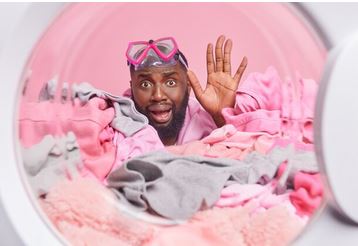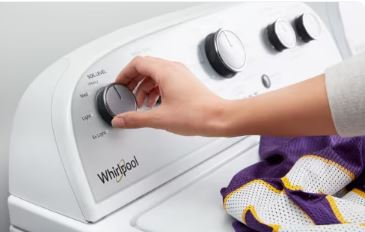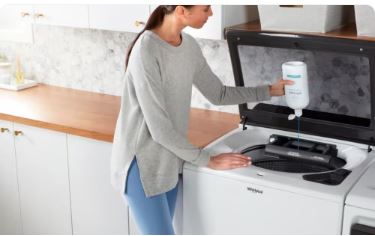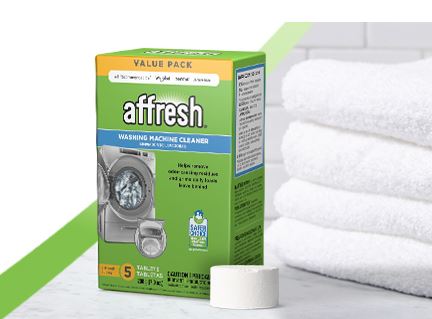Imagine being ready to do laundry after days of piling up only to be taken aback by a mildew-like smell from your top-loading washer! As bizarre as the stench may be, a top loading washing machine smells like mildew because something isn’t right.
In most cases, a top-loading washing machine smells like mildew because of poor aeration (alluding to closing the lid for too long when not using the washer), trapped residues, extra-cold wash temperature, contaminated laundry water, blocked drainage, or bad plumping.
So, there are at least six issues to check, and one could be why your top loader no longer smells nice. Some of those issues are not serious as all you have to do is clean and regularly look after your washer. Others, however, may require help, and I’ll mention them.
And while speaking of cleaning or maintaining your top loader, I’ll share a few ways you can do it and avoid such an annoying stink. So, let’s dive in!

In a hurry? See below how to deal with a top-loading washing machine mildew smell:
Top Loading Washing Machine Smells Like Mildew – Quick Fixes
| – | Likely Reason | Quick Fix |
| 1. | Poor Aeration | Leave the washer’s lid open after use to encourage moisture dry-up and good aeration. |
| 2. | Trapped Residues | Thoroughly clean the washer to get rid of soap scum and other buildups. |
| 3. | Extra-Cold Wash Temperature | Set the washer at a higher temperature. Avoid freezing water. |
| 4. | Contaminated Laundry Water | Don’t use contaminated laundry water. Report the incident to the relevant local authority. |
| 5. | Blocked Drainage | Unblock the drain hose and filter and maintain a good standpipe height to avoid wastewater back-siphoning |
| 6. | Bad Plumbing | Have an expert check and fix your plumbing. |
Why Does My Top Load Washer Smell Like Mildew?
A top-loading washing machine may smell like mildew for different reasons, and below are the most likely ones:
1. Poor Aeration
It’s never a good idea to close the washer’s lid for too long when not using the washer. Reason? That’s because it prevents the trapped moisture from evaporating.
In the long run, the wetness and trapped air mix and create damp conditions, which encourage bacterial proliferation, resulting in a mildew-like smell. So, in reality, there might not be mildew in your washer but only the smell.
Fix
Ensure you leave the lid open after using the washer, especially if it’ll take some time before doing laundry again. At least, that’ll allow good air circulation and drying-up of the remaining moisture in the tub.
But if the smell won’t disappear, properly clean the washer and learn to do it after every use or at least once a week. I’ll share the details on how to do it later.
2. Trapped Residues
Soap scum, fat from fabric softeners, dirt, hair, body oil, and other buildups may also be the reason your top loader stinks like mildew. Once these residues mix with the laundry room’s moisture, they create a toxic concoction whose product is a stinky mildew or rotten egg smell.
This is usually a case of not cleaning the washer regularly or failing to do it thoroughly or adequately when you decide to do it. So, it’s a product of poor washer maintenance.
But still, it could be a product of choice. For example, the use of non-HE (detergent) isn’t recommendable as such detergents produce too many suds, which encourage soap scum buildups.
Also, avoid fabric softeners as they have a lot of fat, and such fats easily clog up and mix with dirt and other residues. Ultimately, that promotes a mildew-like smell, which you don’t want.
Fix
Thoroughly clean the washing machine to get rid of the buildup. To avoid a recurrence, regularly clean the washer, especially parts like the tub and around the agitator, soap dispenser, and lid seal.
Also, avoid using non-HE detergents as they form many suds; instead, use HE detergents. Also, avoid fabric softeners because they have a lot of fat, and you would rather avoid that.
3. Extra Cold Wash Temperature
Though you can run a washing machine with cold water, the water shouldn’t be too cold. If it is, it won’t deter microbial proliferation but will encourage it. That’s because mold thrives under colder conditions but gets denatured by hot water.
Fix
Set your washer at a higher temperature if you can. That’ll discourage mold growth.

4. Contaminated Laundry Water
Sometimes, the issue is with the water you use to do your laundry. If the water is contaminated at the source or along the way before it reaches your home, it’ll be smelly. While this water could smell anything, sometimes the smell mirrors that of mildew, and it’s pretty disgusting.
Fix
Since the contamination could result from the source, this is an area you need to call for help. Report the incident to your local water authority, who’ll advise you accordingly.
5. Blocked Drainage
If there’s a blockage on the filter or drain hose, it may encourage the back siphoning of the wastewater. Once that’s the case, the washer may produce a musty mildew-like smell.
At times, however, this is a case of pushing the drain hose too deep into the standpipe, which doesn’t allow water to drain correctly.
Fix
Check for clogging on the drain hose and filter and clean them thoroughly. While at it, observe the correct standpipe and drain pipe height, as the manufacturer recommends for your washer.
6. Bad Plumbing
How about your plumbing? It could be defective, especially if a professional didn’t do it. If that’s the case, you can expect water stagnation in the drain pipe, which creates a damp environment that encourages bacterial proliferation. Once bacteria proliferate, the washer will start smelling and could smell like mildew.
Fix
This is another area you may need to call for help. Ask a plumber expert to inspect and fix any plumbing issues.
GE Top Load Washer Smells Like Mildew
According to GE, their top-loading washers mostly smell like mildew because of closing the lid for too long while not using the washer. As I explained, that discourages clean airflow; since the trapped water doesn’t escape, it’s likely to mix with air and create perfect conditions for bacterial proliferation. So, what you are smelling could be bacterial growth.
However, GE recommends using Tide Commercial Washer Cleaner to clean your washer when it smells bad. To avoid all that, learn to clean with Tide at least once a month and cover all corners if there are filthy residues and buildups.

LG Top Loader Washing Machine Smells Like Mildew
An LG top-loader washing machine will mostly smell like mildew due to poor aeration. That happens when you close the lid too long and do not allow airflow. But still, you cannot overlook the other issues shared above, such as poor drainage, lousy plumbing, contaminated laundry water, and extra cold-wash temperature.
LG recommends running the Tub Clean Cycle with detergent, vinegar, bleach, or a commercial cleaner, and here’s how to go about it:
- Empty the washer
- Add 1-2 tablespoonfuls of detergent or cleaner
- Run a series of three Tub Clean Cycles and leave the door open at the end of the three cycles to allow the tub to dry up.
Overall, learn to run the Tub Clean Cycle at least once a month to avoid any stinky situation from your LG top loader.
How Do I Get the Mildew Smell Out of My Top Load Washer?
Generally, there’s no easier way to eliminate the mildew smell from your top load washer than to clean it thoroughly, especially around the tub, agitator, lid seal, and soap dispenser. Here are your options:
Option 1 – Commercial Cleaners
You can use numerous commercial washing machine cleaners (View on Amazon) to clean your top-loading washer and remove the mildew stench. GE, for example, recommends the Tide Washing Machine Cleaner, while Whirlpool, Maytag, Samsung, and Amana recommend Affresh for all-around cleaning.
But still, there are other good ones such as True Fresh, Active, OxiClean, Renuv, and Clean People Washing Machine Cleaners. You can use any commercial cleaner to clean the tub, drain hose, filter, drum, pump, agitator, and other parts.
Generally, these commercial cleaners come with their usage instructions, which you should follow and may differ between them. For example, here’s how to clean your washer with Afresh:
- Empty your washer (remove any clothes from the tub)
- Put one tablet of afresh into the tub, select a hot water setting, and run a clean Normal wash or Heavy Cycle.
- Wait for the cycle to complete and wipe around the corners of the washer, its lid, and other parts that could be dirty – possibly with a microfiber cloth soaked in water containing Affresh.
- Repeat up to three times if the bad smell won’t go away or if the washer is extremely dirty.
Consider using Affresh to clean your washer every 30 cycles or once a month if you do laundry almost daily.

Option 2 – DIY Cleaners
If you prefer to make your washer cleaner at home or use what’s available locally or within the house, consider using any of the following:
a) Bleach
You can use bleach to clean your stinky top loader using these steps:
- Empty your washer and fill it up with hot water
- Choose the most extended cycle and add 1 cup of bleach to the tub
- Run the cycle and then rinse the washer
- Wipe around the lid with a microfiber cloth soaked in the bleach solution
b) White Vinegar
You can use white vinegar in place of bleach to clean your washing machine as follows:
- Empty the washer and set it on the hottest setting
- Add 4 cups of white vinegar into the tub, but no detergent
- Fill up the washer with hot water and wait for 30 minutes
- Run the wash cycle and dry the washer
c) Vinegar + Baking Soda
You can also combine white vinegar with baking soda and use it to clean your top loader as follows:
- Empty the washer
- Mix 1 cup of vinegar with one cup of baking soda and pour the mixture into your top loader.
- Run the hottest cycle available
- Wipe the washer dry
Concluding Thought On Why a Top Loading Washing Machine Smells Like Mildew:
Above are the six issues to check when your top-loading washing machine smells mildew. Remember, it could be due to not leaving the lid open after not using the washer for a long time, lack of cleaning, which leads to residue buildup, use of extra cold or contaminated water, poor drainage, or bad plumbing.
Also Read:
